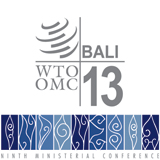9TH WTO MINISTERIAL CONFERENCE, BALI, 2013
Briefing note: Trade in services
Ranging from construction to tourism and from distribution to finance, services are the largest and most dynamic component of almost all developed and developing country economies. Telecommunications and transport in particular are pivotal elements in the global value chains that have proliferated in recent years. Opening up such services means fostering new trading opportunities for businesses worldwide across virtually all commercial activities and enhancing the economic performance of countries overall.
Updated: November 2013
THIS EXPLANATION is designed to help the public understand developments in the WTO. While every effort has been made to ensure the contents are accurate, it does not prejudice member governments’ positions.
> Ministerial Conferences
> Bali Ministerial Conference
> Other briefing notes
Services now account for over 40 per cent of world trade, if measured in value-added terms, and two-thirds of the world's foreign direct investment stock.
Services were first integrated into the multilateral trading system as a result of the Uruguay Round of trade negotiations, which led to the creation of the General Agreement on Trade in Services (GATS). The GATS establishes a framework to specify WTO members' trade obligations in services, which they have laid down in their respective schedules of specific commitments. It also defines standards of transparency (such as the obligation for a member to publish all measures falling under the agreement) and good governance.
Since the focus of the Uruguay Round was on creating the architecture of the GATS, rather than on advancing actual opening of services trade, the GATS commits members to enter into successive rounds of negotiations "with a view to achieving a progressively higher level of liberalization". The negotiations are mandated to take place at the bilateral, plurilateral or multilateral levels and are intended to increase the general level of specific commitments undertaken by members. In addition, the GATS commit members to negotiate in four rule-making areas (domestic regulation, emergency safeguards, government procurement, and subsidies) that were not concluded in the Uruguay Round.
The GATS defines four “modes” through which services may be traded
- Mode 1, known as “cross-border trade”, is equivalent to the conventional concept of trade where products are supplied from one territory into another (e.g. international phone calls).
- Mode 2 consists of the supply of services in a member's territory to consumers/users originating from another member, with tourism as a typical example, and is called “consumption abroad”.
- Mode 3, known as “commercial presence”, is defined as the supply of a service by a supplier/investor of one WTO member that is established in the territory of another member.
- Mode 4, referred to as “presence of natural persons", includes the supply of services by foreign persons (architects, nurses, fashion models, etc.) in the territory of another member.
Services negotiations under the Doha mandate
A new round of multilateral services negotiations started in January 2000, as mandated in the GATS, and has continued under the Doha Development Agenda. The focus of the negotiations is on widening and deepening current trading conditions in services while respecting a member's right to regulate according to its national policy objectives. It is for each government to decide on which sectors and to what extent it is ready to commit to market access under the GATS.
To facilitate swifter progress in the negotiations, ministers recognized at the 8th Ministerial Conference in 2011 that, while respecting the principles of transparency and inclusiveness, members needed to explore more fully different negotiating approaches.
In the meantime, outside the WTO, a group of members has emerged to negotiate a Trade in Services Agreement (TiSA). The stated objective is to achieve an ambitious outcome, compatible with the GATS, that would attract broad participation and that could be multilateralized in the future. The Council for Trade in Services, the body overseeing the operation of the GATS and ongoing developments in services trade, has been kept informed of this initiative on a regular basis.
Negotiations in the four rule-making areas mentioned above have continued in parallel. The Working Party on Domestic Regulation is mandated to develop disciplines to help prevent regulating measures taken by governments – such as licensing and qualification requirements and procedures and technical standards – from unnecessarily restricting trade. The Working Party on GATS Rules is dealing with issues not currently addressed under the agreement, i.e. emergency safeguard measures, government procurement in services, and subsidy disciplines that might be necessary to avoid trade distortions.
LDC services waiver
The services waiver for least-developed countries (LDCs) was approved at the 8th Ministerial Conference in 2011. It allows WTO members to grant more favourable treatment to services and service suppliers from LDCs on a specified range of measures, thus making an exception to the basic non-discrimination principle of the multilateral trading system. The underlying objective, enshrined in the Preamble to the Marrakesh Agreement establishing the WTO, is to help these countries to secure a share in the growth in trade commensurate with their development needs.
While the waiver created the legal framework for extending preferential treatment for LDC exports, the focus now is on defining the content. Ministers at the 9th Ministerial Conference in Bali will consider a draft text to help operationalize the waiver.
